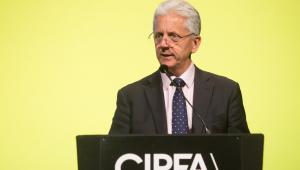Val Andrew, business management specialist from the ASCL union, pointed out to CIPFA’s 2017 Academies Conference in London on Tuesday that the education sector is facing a £3bn funding shortfall due to cost pressures after already enduring years of cost-cutting.
“They [government guidelines on savings] are slightly naive in some respects”, she said.
“Effective procurement [one of government’s saving suggestions] is not going to produce the level of savings that you need to address that £3bn saving, it is just not there.”
Andrew explains that school budgets are already tight with between 55% and 75% of budgets going on teaching costs and most of the rest going on support staff with around 15% to 20% on fixed costs.
Andy Fisher, audit manager at the National Audit Office, also spoke at the event and said that schools are facing a “massive challenge” in the coming years.
He said: “The evidence suggests that schools are cutting spending on teaching staff, ahead of other categories.
“Making savings by increasing class sizes, teacher contact time reducing and the amount of teaching undertaking by senior staff is increasing, also a greater reliance on unqualified staff and staff teaching outside their specialism.”
Fisher said the government expects schools to make savings through improved procurement and using staff more effectively.
But he pointed out the majority of schools are smalls primary schools and therefore cannot make the same savings through procurement as large secondary schools.
Adding: “Surely the most obvious thing to do is try and get your saving from those areas which are not going to affect teaching quality.”
He noted the government will spend £42bn in 2019/20 on education but believed this was offset by rising inflation, costs and most importantly growing pupil numbers, which meant many schools face a real-terms cut despite the increase in cash from central government.
Fisher added: “We don’t feel that the departments, whether communities and local government or department for education does enough to be able to strength test some of their assumptions around the pressures on the system.
“And making significant changes to funding really needs to come with some economic modelling as well as some testing on the ground.”
Fisher said he saw “many practices” in the school sector which led him to question whether government “understands the implications” on public spending and the quality of education which their changes to the school system were having.
He urged the department for education to consider the impact of policies promoting free schools, adding: “Our challenge to the department is, to what extent do you understand the implications on existing schools and how do you measure the benefits and value of choice [for parents].”




















